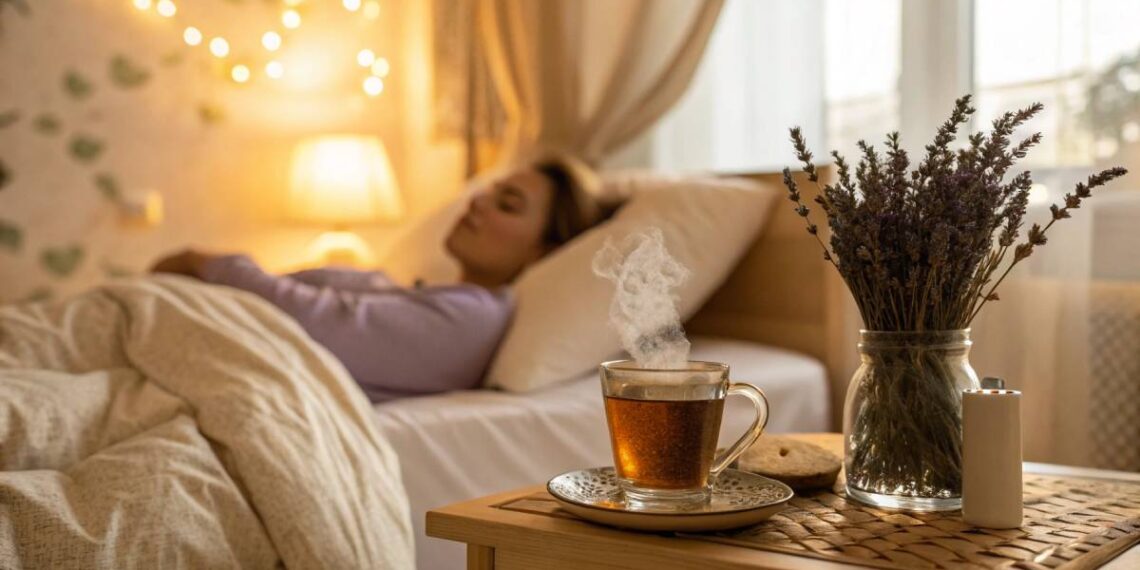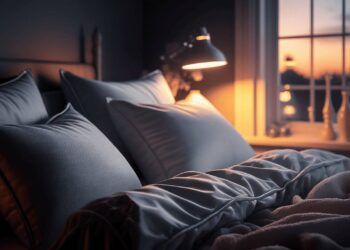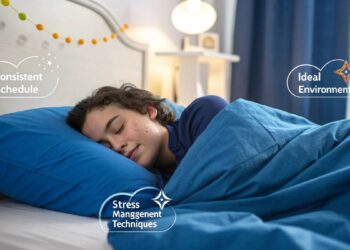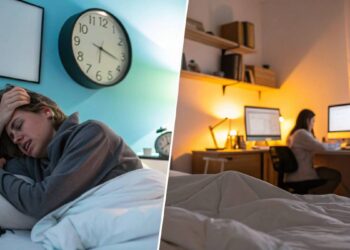Ever tossed through the night, begging sleep to come? You’re not alone. Sleep isn’t just a luxury—it’s the secret sauce for a sharper mind, happier heart, and healthier body. But when counting sheep fails, natural solutions step in. From herbal teas that calm your nerves to bedtime rituals that sync with your body’s rhythm, this guide unlocks science-backed strategies to transform restless nights into restorative slumber. Ditch the pills and discover how tiny tweaks to your environment, diet, and habits can make sleep your superpower. Ready to reclaim your nights? Let’s dive in.
Key Takeaways
- Sleep impacts everything: Boosts immunity, stabilizes mood, and sharpens focus.
- Natural remedies > pills: Herbal teas, essential oils, and mindfulness avoid side effects.
- Environment matters: Dark, cool rooms and screen-free zones prime your body for rest.
- Diet plays a role: Tryptophan-rich foods aid sleep; caffeine and sugar sabotage it.
- Tech can help or hurt: Use sleep trackers and white noise apps, but ban screens before bed.
Introduction to Natural Sleep Solutions
The Significance of Quality Sleep
Good sleep does wonders for your body, mind, and spirit. It touches everything, from how you fight off germs, to staying cheerful and making smart choices. Without it, everything can go haywire—your mood tanks, your immune system sags, and you may even find yourself making some pretty questionable decisions. Long nights of tossing and turning aren’t just annoying—they mess up your entire groove.
| Health Aspect | What Good Sleep Does for You |
|---|---|
| Physical Health | Boosts immune function, tames inflammation, keeps your heart ticking strong |
| Emotional Balance | Lifts mood, eases stress, guards against the blues |
| Cognitive Function | Keeps your memory sharp, decision-making slick, focus laser-sharp |
For those who wrestle with sleep woes, cracking this nut is a real necessity. If you’re shying away from popping pills, natural remedies just might be your sleep savior.
Why Go Natural with Your Sleep Solutions
Natural sleep solutions are like bringing a hug to your bedtime routine. They cut out the nastiness of drug side effects and keep you feeling good about what’s going into your body. Why roll with natural remedies? Let’s break it down:
- Safety First: Things like herbal teas and supplements? You’re mostly in the clear with these. Easier on the system than a lot of meds out there, and they won’t have you hooked.
- Holistic Vibes: They don’t just patch things up—they dig into why you’re sleepless in the first place, tackling stress and worry with soothing methods like meditation for sleep or a relaxing routine.
- Lasting Payoff: Healthy sleep habits aren’t just a quick fix. Tweak your space into a sleep-friendly bedroom, you’re setting up for some epic Z’s long-term.
| Natural Solution | Why It Works |
|---|---|
| Herbal Teas | Chill out and quiet the mind |
| Essential Oils | Set the mood for snooze time |
| Regular Exercise | Gives you deeper, more satisfying sleep |
Getting the most out of these can mean leaving meds on the shelf. With dietary tweaks, a handful of herbs, and a few lifestyle shake-ups, there’s a solid path out there to better sleep. If you’re looking to geek out on specifics, our guides to best natural sleep aids and herbal teas for sleep spill all the beans.
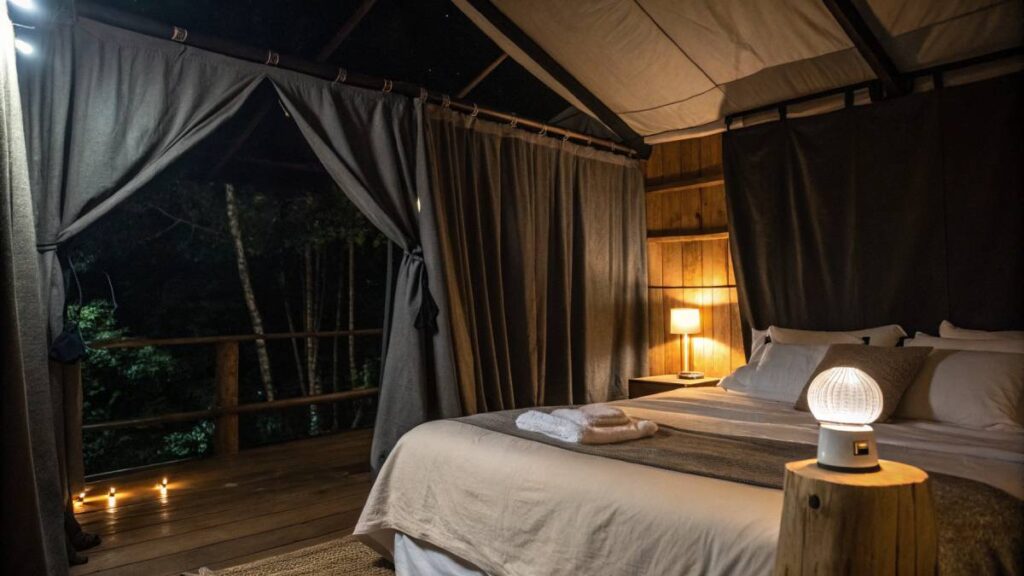
Establishing Healthy Sleep Habits
Getting your Z’s in check isn’t just about closing your eyes and hoping for the best. You need to craft the perfect snooze set-up and stick to a schedule that would make even the laziest house cat jealous. Let’s figure out how to turn your bed into a temple of rest.
Creating a Sleep-Friendly Environment
Your bedroom can make or break your night’s sleep. Here’s how to set it up right:
- Keep It Dark: Make sure your sleep cave is as dark as a midwinter night. Block out intruders like streetlights and moonbeams with heavy curtains or an eye mask.
- Temperature Control: Crank that thermostat down a bit. A chillier room between 60-67°F (15-19°C) helps lull you into dreamland.
- Silence, Please: Block out your noisy neighbors with earplugs or a trusty white noise machine. Peace and quiet, here we come.
- Your Sleep Nest: Snuggle into a cozy mattress and pillows. If yours are feeling a bit flat, check out our guide on the best mattress for sleep.
- Ditch the Screens: Kick your gadgets outta the bedroom. They’re party poopers for your sleep hormones. Want to know more? Check our take on digital detox sleep benefits.
For a deep dive into crafting your perfect sleep zone, don’t miss our piece on sleep-friendly bedroom.
Establishing a Consistent Sleep Schedule
Riding the wave of your body’s internal clock is pure magic for good sleep. Here’s how to keep it ticking smoothly:
- Regular Bedtimes Rule: Tuck in and rise at the same time daily, weekends included. It’s your ticket to a solid sleep-wake schedule.
- Relax Ya Self: Get into soothing activities before bed—a book, a warm bath, or some calm-inducing meditation for sleep.
- Short and Sweet Naps: No long siestas, especially late in the day. Keep naps short & sweet to leave room for sweet dreams at night.
- Sunshine Dose: Soak up some rays each day. It’ll help balance your circadian rhythm and have you resting easy come nighttime.
- Watch What You Consume: Steer clear of caffeine and big meals as sleep time approaches. Caffeine can keep buzzing in your system for hours. Want to tweak your diet for a better snooze? Check out our diet for better sleep.
| Action | Recommended Time |
|---|---|
| Wake Up | 7:00 AM |
| Sunshine Session | 8:00 AM |
| Cut Caffeine | After 2:00 PM |
| Begin Bedtime Routine | 9:00 PM |
| Hit the Hay | 10:00 PM |
Get the scoop on rock-solid bedtime routines in our article on bedtime routine for adults. Plus, discover smart ways to reset circadian rhythm.
These tips are your go-to for catching quality Z’s without needing sleep meds. By curating your sleep zone and sticking to a regular routine, you’ll up your snooze game to a whole new level.
Mind-Body Techniques for Better Sleep
Finding ways to sleep better without popping pills is a win for anyone who struggles to catch those Z’s. Mixing in some mind-body moves, like chilling out with meditation and slowing down your breath, can help you snooze like a champ.
“Sleep is the best meditation.” – Dalai Lama
Relaxation and Meditation Practices
Relaxation methods and meditation are great for mellowing out and getting your body in sleep mode. Stress and anxiety have a way of messing with your slumber, but these tricks can help keep ’em at bay. Try out these relaxation and meditation favorites:
- Progressive Muscle Relaxation (PMR): Tense up, then let go of each muscle group, and feel the tension melt away like butter on a hot pancake.
- Guided Imagery: Picture calming scenes in your head—a sandy beach or gentle rain—it’s like a mini-vacation that takes the edge off and lulls you to sleep.
- Mindfulness Meditation: Keep your mind in the ‘now’ and watch your thoughts like clouds passing by. Curious about how this quiets the mind for better sleep? Check out meditation for sleep.
Getting into these habits can tell your body that it’s time to wind down and hit snooze-town.
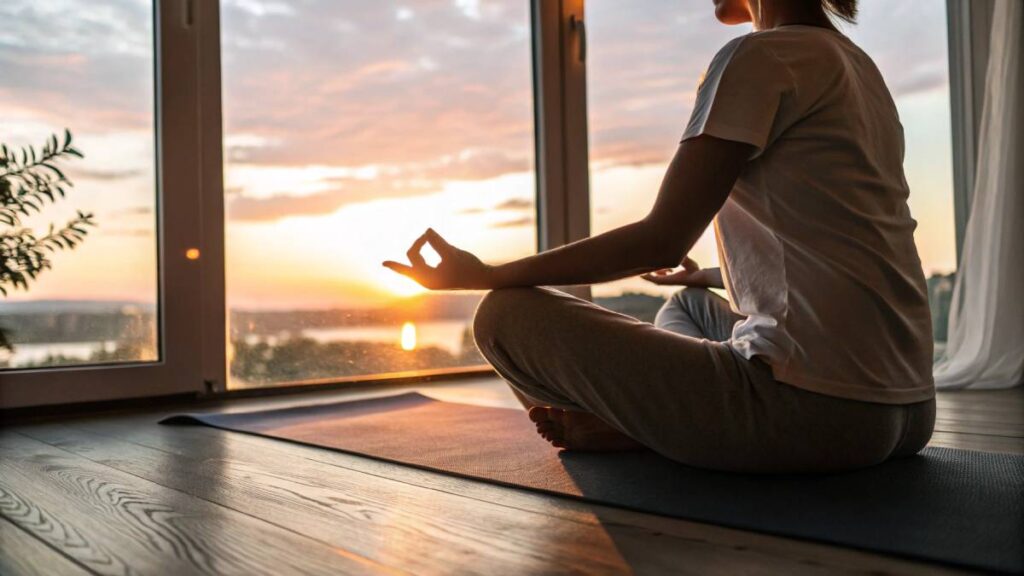
Deep Breathing Exercises
Want to up your sleep game? Deep breathing can work wonders. Slow breaths steady the heart, ease that high blood pressure, and dial down stress. Here are some breathing methods to try:
- 4-7-8 Breathing: Breathe in for 4 seconds, hold it for 7, then let it out for 8. It’s like a secret weapon to calm nerves and kickstart sleep.
- Diaphragmatic Breathing: Breathe deep from your belly not your chest. Better oxygen flow plus a tranquil nervous system equals awesome sleep.
- Box Breathing: Inhale for 4 seconds, hold for 4, exhale for 4, then hang onto that breath for another 4. It’s a surefire way to zap anxiety and chill out.
| Technique | Inhale (Seconds) | Hold (Seconds) | Exhale (Seconds) | Hold (Seconds) |
|---|---|---|---|---|
| 4-7-8 Breathing | 4 | 7 | 8 | – |
| Diaphragmatic Breathing | Deep breath | – | Slow release | – |
| Box Breathing | 4 | 4 | 4 | 4 |
If counting sheep just isn’t cutting it, pair these breathing methods with relaxation and meditation for a killer pre-bedtime routine. Dive into how to make bedtime work for you in bedtime routine for adults.
Mixing these mind-body moves into your nightly groove can make a world of difference, turning restless nights into peaceful slumbers and groggy mornings into bright beginnings.
Dietary Strategies for Improved Sleep
You know that feeling when you crash into bed but sleep tiptoes away? Turns out, what you munch on before bedtime can either invite the snooze fairy in or keep her out partying. Here’s a peek at food choices that’ll pave the way for dreamland and those sideline snacks you might wanna dodge right before hitting the sack.
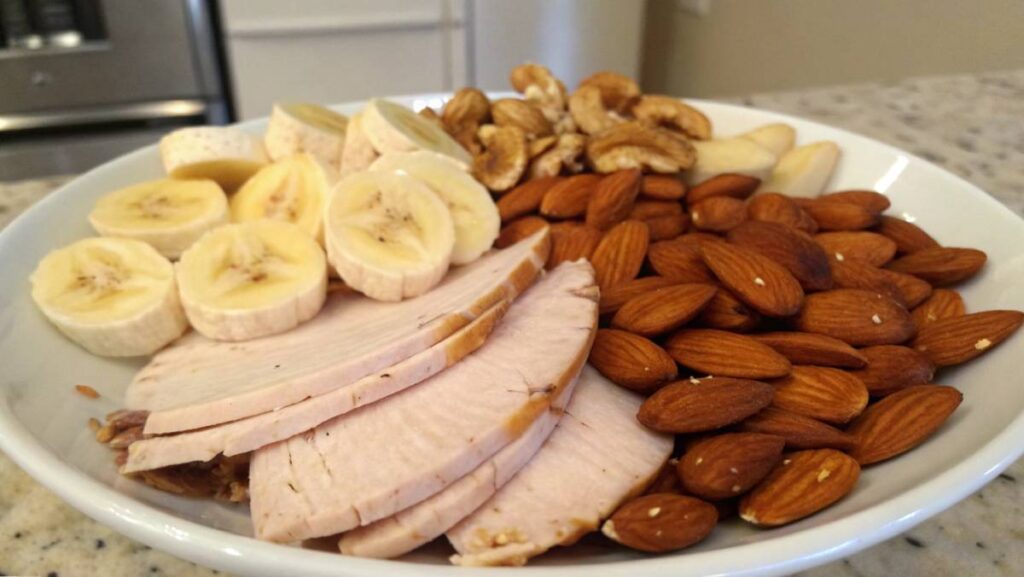
Foods that Promote Sleep
It’s no secret that certain munchies pack ingredients that nudge you toward dreamland. Toss these goodies into your dinner line-up for a shot at snoozing like a baby.
- Stuffed with Tryptophan: This fancy-sounding amino acid is all about cranking up serotonin, the hormone that whispers sweet sleep. Gobble some turkey, chicken, or cheese and let them do the legwork.
- Mighty Magnesium Munchies: Known for turning frowns into sleepy faces, magnesium is your muscles’ best bud. Snack on almonds, spinach, or bananas to ease into slumber.
- Melatonin Magic Makers: This guy smoothens the hiccups in your sleep-wake groove. Snack on tart cherries, grapes, or tomatoes for a melatonin boost.
- Complex Carb Comfort: Chow down on complex carbs like oatmeal or whole-grain bread to help the brain soak up more tryptophan, the snooze facilitator.
| Food Type | Examples |
|---|---|
| Tryptophan-Filled | Turkey, Chicken, Cheese |
| Magnesium-Filled | Almonds, Spinach, Bananas |
| Melatonin-Filled | Tart Cherries, Grapes, Tomatoes |
| Complex Carbs | Oatmeal, Whole Grain Bread, Quinoa |
For more juicy tidbits on sleep-boosting meal plans, check out our piece on diet for better sleep.
Foods to Avoid Before Bed
Heads up: Chowing down these guys too close to bedtime might boot you off the sleep train, leaving you tangled with discomfort or jittery as a squirrel.
- Caffeine Crimes: Found in coffee, tea, soda, and chocolate – caffeine’s the night owl’s frenemy. It’ll rob you of sleep quicker than you can say “espresso”.
- Alcohol Myth Buster: Starts off like a sleepy lullaby but quickly switches to a track that keeps you tossing and turning.
- Spicy Saboteurs: Indigestion central! These heat-mongers make snooze time feel like heartburn city.
- Sugar Shockers: They’ll spike, then crash your sugar levels, leaving you wide-eyed when the clock strikes midnight.
- Fatty Food Follies: These take their sweet time to digest and could leave you feeling like a bloated balloon.
| Food Type | Examples |
|---|---|
| Caffeine | Coffee, Tea, Soda, Chocolate |
| Alcohol | Beer, Wine, Liquor |
| Spicy Foods | Hot Peppers, Spicy Sauces |
| Sugary Foods | Cake, Candy, Soda |
| High-Fat Foods | Fried Foods, Fast Food, Cheese |
Giving these munchies the cold shoulder before slipping into your pajamas can really up your sleep game. For the lowdown on snooze-worthy snacks, swing by our article on foods for better sleep.
Tweaking your diet works wonders next to other natural sleep helpers, like setting up a sleep-friendly bedroom or chilling with meditation for sleep. Smart eating puts the snooze meter on high so you can tackle the day with a pep in your step.
Herbal Remedies and Supplements
Popular Herbal Remedies for Sleep
When you’re searching for natural ways to hit the hay more peacefully, herbal remedies can be a game-changer. They’re your go-to when you want to snooze without popping pills that sometimes come with unwanted tags as side effects.
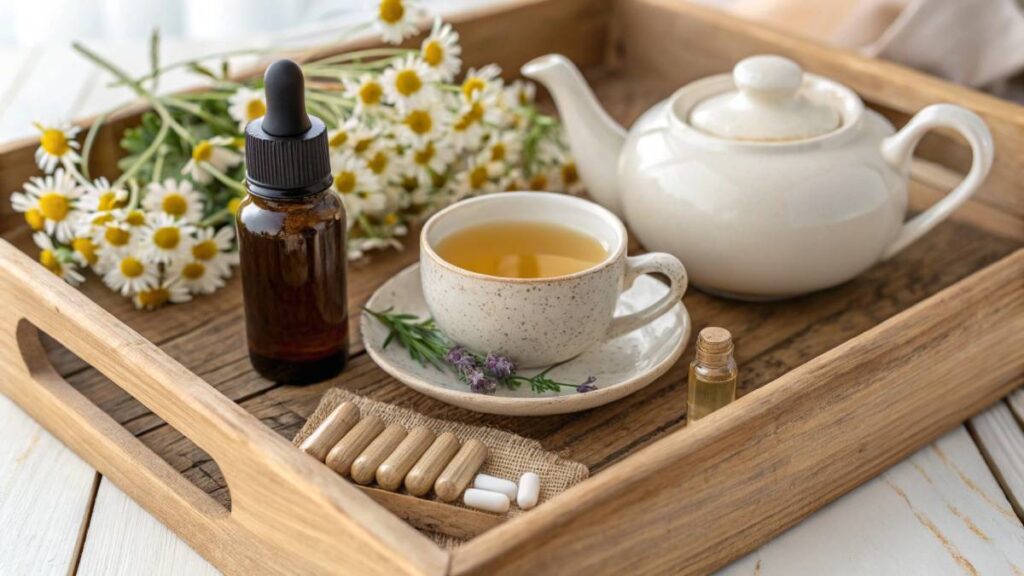
Valerian Root
A favorite in the sleepytime club, Valerian root’s kind of like nature’s lullaby. It’s been around the block with its knack for shortening the time you grunt and groan before nodding off. Plus, it can make your shut-eye quality better—you know, less flipping and flopping at night.
Chamomile
This one’s like mom’s warm hug—reliable and comforting. A cup of Chamomile tea before bed? Yes, please! It’s gentle on the nerves and helps in coaxing your eyeballs into dreamland mode, natural-style. Peek at more through fall asleep naturally.
Lavender
Ah, lavender. It smells like a hug with a sprinkle of magic. Diffuse it, slather it, or soak in a bath with it—either way, it helps calm that busy mind. Say bye-bye to jittery jitters and hello to peaceful dreams. Curious? Scoop more on essential oils for sleep.
Passionflower
For those nights when stress feels like a marching band in your brain, passionflower comes to the rescue. In tea or supplement form, it’s got calming vibes that add ease when you’re struggling with insomnia’s funky beats.
Lemon Balm
Lemon balm, taking the minty magic up a notch, is known to settle those nerves and guide you gently towards Sandman city. Whether you’re sippin’ it as tea or taking a supp., it’s got your back for sleepy adventures.
| Herbal Remedy | Common Form | Known Effects |
|---|---|---|
| Valerian Root | Capsules, Teas | Calms the mind, boosts sleep quality |
| Chamomile | Teas | Tames anxiety, soothes nerves |
| Lavender | Essential Oils | Eases stress, whispers relaxation |
| Passionflower | Teas, Supplements | Tamps down stress, soothes insomnia |
| Lemon Balm | Teas, Supplements | Settles nerves, aids restful sleep |
Got a craving for soothing teas? We’ve got you sorted here: herbal teas for sleep.
Considerations for Sleep Supplements
While going natural for sleep can work wonders, it’s smart to keep some stuff in mind before diving into bedtime supplements.
Safety and Interactions
Always chat up your doc before trying new supplements—especially if you’re juggling meds already. Some herbal pals can throw tantrums when mixed with prescriptions.
Dosage and Timing
Getting the dose just right is like hitting that perfect note. Too much and you might never wake up (figuratively, of course), too little and you’re wide awake counting sheep.
Quality and Purity
Nobody wants a supplement that’s as shady as a back-alley vendor. Opt for products with a stamp of purity—inspect them like the inspector you never thought you’d become!
Individual Response
Just like Grandma’s secret cookie recipe, sleep remedies aren’t a one-size-fits-all. Your body might vibe with one herb over another. Track your snooze time with a handy app or an old-school notebook to figure out what clicks.
If sleep stubbornly refuses to cooperate, or you find yourself yearning for custom advice, a healthcare provider’s sage wisdom might just be the ticket. Unearth more info on when to ring them up over at reset circadian rhythm.
Keeping these tidbits in mind, you’ll be set to explore supplements that’ll tuck you in nicely. For even more enlightening tips, visit best natural sleep supplements.
For extra reads on turning those pesky Zzz’s into friendlier vibes, dive into more articles like natural remedies sleep apnea and foods for better sleep. Sweet dreams!
Lifestyle Adjustments for Better Sleep
Sometimes getting a good night’s sleep feels like trying to catch a greased pig – wily and elusive. Yet, some small tweaks in the way you live can up your sleep game and help you tackle pesky insomnia. We’re here to help you figure out how exercise and giving stress the boot can make a world of difference to your sleep.
Exercise and Physical Activity
Think of exercise as your secret weapon against bad sleep. When you get moving, it sets your internal clock just right, making it a cinch to crash at night and pop up refreshed come morning. Exercise doesn’t just tire you out in a good way; it can also kick anxiety and depression to the curb, both of which like to mess with your Zs.
Not all exercise is the same, but each has its perks for sleep:
- Aerobic Exercise: Dancing, jogging, or going for a swim gets your heart pumping and sets you up for sweeter slumber.
- Strength Training: A bit of weight lifting can make muscles – and dreams – a little stronger.
- Yoga and Tai Chi: Combine some gentle stretches with chill vibes to get your whole body and mind in tune for better rest.
| Exercise | How Often | How Long |
|---|---|---|
| Aerobic | 3-4 times a week | 30-40 minutes |
| Weights | 2-3 times a week | 20-30 minutes |
| Yoga/Tai Chi | Daily | 20-30 minutes |
Get the lowdown on how exercise can make sleep better by checking out our piece on exercise for better sleep.
“A well-made bed is a recipe for dreams.” – Dr. Matthew Walker
Managing Stress and Anxiety
Stress and its best buddy anxiety are a sleep thief’s calling cards. Taming these wild beasts can make falling asleep a lot less like pulling teeth. Here’s how to tackle them:
- Mindfulness and Meditation: Think of this as a mental chill pill. Breathing deep, focusing the mind, and slowly unwinding your muscles can turn chaos into calm. Dive into our meditation for sleep guide.
- Establishing a Bedtime Routine: Getting into the groove before bed can hint to your body that it’s time to switch off. Try a bestseller and a bubbly bath. Check out the scoop on bedtime routines for adults.
- Limiting Stimulants: Don’t let coffee or a heavy meal be the things keeping you awake. Learn the ropes in our diet for better sleep.
- Journaling: Put pen to paper to say “bye bye” to swirling thoughts before you hit the sack.
| Stress Fix | Stuff You Need | How Long |
|---|---|---|
| Meditation | Quiet corner, apps | 10-20 minutes |
| Routine | Bath goodies, a book | 30-60 minutes |
| Journaling | Journal, a pen | 10-15 minutes |
Making these changes can turn your sleep from “meh” to marvelous. If stress is killing your shut-eye, peek at our article on stress and sleep solutions.
Technology and Sleep
Alright, so technology is everywhere, right? It’s like your inseparable buddy these days. But, ever wondered how it messes with your zzzs? Or how it might actually help you snooze better? Well, let’s get into that.
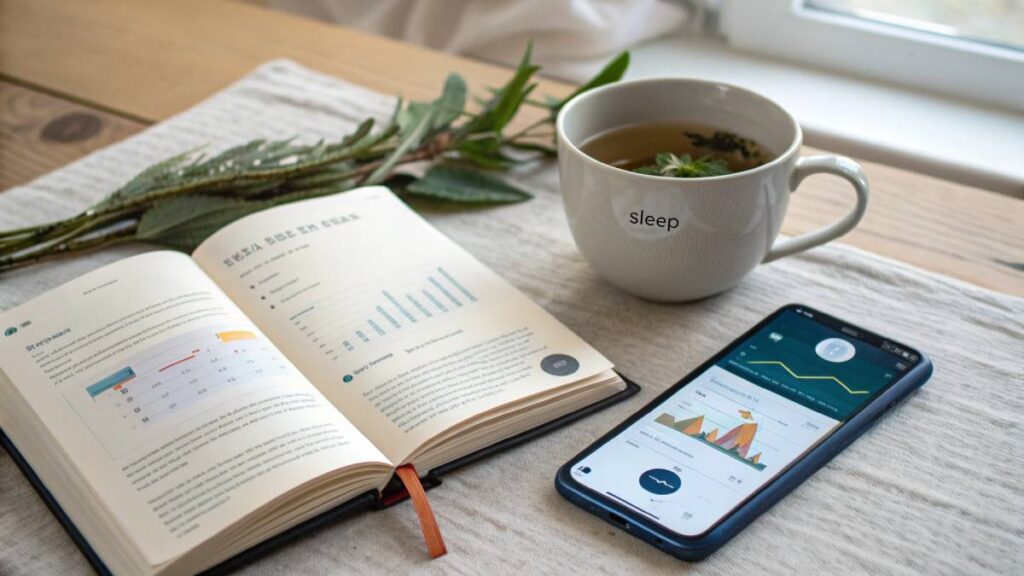
Utilizing Technology for Better Sleep
Believe it or not, tech can be your sleep buddy if you use it right. There are handy gadgets and apps out there that can nudge you towards better sleep habits and create a peaceful sleep zone.
Sleep Tracking Apps and Devices
Those nifty little sleep trackers and apps? They’re like your personal sleep detectives, giving you the scoop on your sleep cycles and where they’re tripping up.
| Doohickey | Perks |
|---|---|
| Sleep Cycle Tracking | Watches your REM, light snooze, and the deep dive into dreamland |
| Sleep Quality Analysis | Gives you the big picture of how you sleep |
| Smart Alarms | Wakes you up just right—not in the middle of a perfect dream |
Sound Machines and White Noise Apps
Ever used a sound machine? Or maybe a white noise app? They’re the unsung heroes of good sleep, softening those annoying nighttime noises and lulling you into deeper sleep.
- Ocean waves
- White noise
- Chill tunes
Blue Light Filters
Got gadgets with blue light filters? They help keep that beckoning blue glow from wrecking your melatonin—nature’s sleep juice—thereby helping keep your body clock on the beat.
Curious about tweaking your body clock? Check out our guide on reset circadian rhythm.
Limiting Screen Time Before Bed
Okay, let’s be real—screens are great and all, but they love to mess with your sleep. How can you keep technology in check before bedtime?
Negative Impact of Blue Light
That sneaky blue light? It’s a melatonin killer. Cut down your screen time before hitting the hay, and your body will thank you with better melatonin levels.
| Screen Time Activity | Stop Before Bed |
|---|---|
| Scrolling on Your Phone | 1-2 hours |
| Binge-Watching Netflix | 1-2 hours |
| Working on Your Laptop | 1-2 hours |
Developing a Digital Detox
Ever tried a digital detox? It’s like giving your brain a break and syncing your body clock with nature.
- Say no to screens before bed.
- Dive into a book or meditate (not the app kind, the real deep-breathing one).
- Keep your lights dim and cozy to wind down the right way.
Creating a Sleep-Friendly Bedroom
Use tech to turn your bedroom into a sleep haven. Smart lights that dim to mimic the sun going down or mattresses tweaking their temp can do wonders.
For more on tuning down screen dependence, hop over to our piece on digital detox sleep benefits.
Get into the groove of pairing tech with mindful habits, and you might just find a dreamier way to wind down while dodging tech’s disruptive side.
Seeking Professional Help
When to Consult a Healthcare Provider
If counting sheep just isn’t cutting it and you’ve tried all the sleep tips under the sun, it might be time to chat with a healthcare pro. Some sleep problems are sturdy enough to ignore your tricks and tips, and that’s when you ring up the experts. Watch out for these symptoms, since they might be waving a flag that it’s time for some professional attention:
- Can’t drift off or stay off the dreamland train several nights a week
- So tired during the day, you could nap standing up
- Your snoring or breath-catching could give a bear pause
- Stress, anxiety, or the blues keep playing their greatest hits while you try to sleep
The doc might throw you a lifeline in the shape of advice or suggest checking your sleepy time with a study, so everything from sleep apnea to twitchy legs can be ruled out. Want more tips on falling asleep naturally? Hop over to our guide on how to fall asleep naturally.
Alternative Therapies for Chronic Sleep Issues
If you’d rather hug a tree than a medicine bottle for sleep woes, alternative therapies might be the way to go. These approaches tackle snoring or tossing and turning without drug-aid and aim to find the root of the problem.
Acupuncture
Acupuncture sticks tiny needles where your body needs them most, according to ancient wisdom. This Chinese tradition might just tune your body’s energy orchestra toward a sleepy song. Some studies give acupuncture a thumbs-up for cutting insomnia problems down a peg.
Cognitive Behavioral Therapy for Insomnia (CBT-I)
CBT-I takes your bad sleep habits and gives them a makeover. It’s a program that helps you shape up your snooze rituals and time your rest sessions better. Many insomniacs wave the victorious flag after trying it out.
Yoga and Meditation
Yoga and meditation are like sending your brain and body to a relaxing spa. Stretching and deep breathing ease stress and up your wellness game. There’s a bunch of calming ways to up your zen and snooze well; our write-up on meditation for sleep explains it all.
| Therapy Type | How Many Times You Need to Try | How Often it Works |
|---|---|---|
| Acupuncture | 5 – 10 | 60% – 70% |
| CBT-I | 6 – 8 | 70% – 80% |
| Yoga | Forever | 50% – 60% |
| Meditation | Forever | 50% – 60% |
Herbal Medicine
Herb buddies like valerian, chamomile, and lavender are stars in the bedtime show. They’re the calming kind, the ones people say can lull you into a peaceful sleep. Read more about herbs that rock sleepy time in herbal teas for sleep.
Essential Oils
Essential oils get a hand in the snooze game, too. Scents like lavender and chamomile are the main players in making your room and mind a tranquil haven. Pop these scents in a diffuser and let your mind wind down. Curious about it? Check out our article on essential oils for sleep.
Giving these natural options a shot may just help you reclaim your nights and snooze without a hitch.
Conclusion
Sleep isn’t a puzzle—it’s a practice. By blending cozy environments, mindful routines, and nature’s remedies, you can turn restless nights into rejuvenating rest. Remember: your bedroom is a sanctuary, not a workspace. Dim the lights, sip chamomile, and let lavender oil whisper relaxation. Swap late-night scrolling for yoga stretches or a warm bath. Even small changes, like a consistent bedtime or magnesium-rich snacks, add up to big wins. And if stress still creeps in, mindfulness or a chat with your doctor can reset your rhythm. Whether you’re battling insomnia or just craving deeper sleep, these strategies offer a drug-free path to waking up refreshed. Your best sleep starts tonight—one deep breath, one herbal tea, one screen-free hour at a time. Sweet dreams!
FAQs
What foods help you fall asleep faster?
Foods rich in tryptophan (turkey, bananas) and magnesium (spinach, almonds) boost sleep hormones. Avoid caffeine and sugar before bed.
How does exercise improve sleep?
Daily activity regulates your circadian rhythm and reduces stress. Aim for 30 minutes of aerobic exercise or yoga.
Are herbal sleep supplements safe?
Most (valerian, chamomile) are gentle, but consult a doctor if taking medications.
Resources
- National Sleep Foundation: Sleep Hygiene
- Mayo Clinic: Insomnia Solutions
- Guided Sleep Meditations (Headspace)
Final Thoughts
Sleep is the ultimate reset button. By prioritizing natural solutions—like a dark bedroom, mindful breathing, and stress-busting routines—you’re investing in long-term wellness. Start small, stay consistent, and let your body thank you.
Recommended Products
- Weighted Blanket
- White Noise Machine
- Organic Chamomile Tea
- Lavender Essential Oil Diffuser

